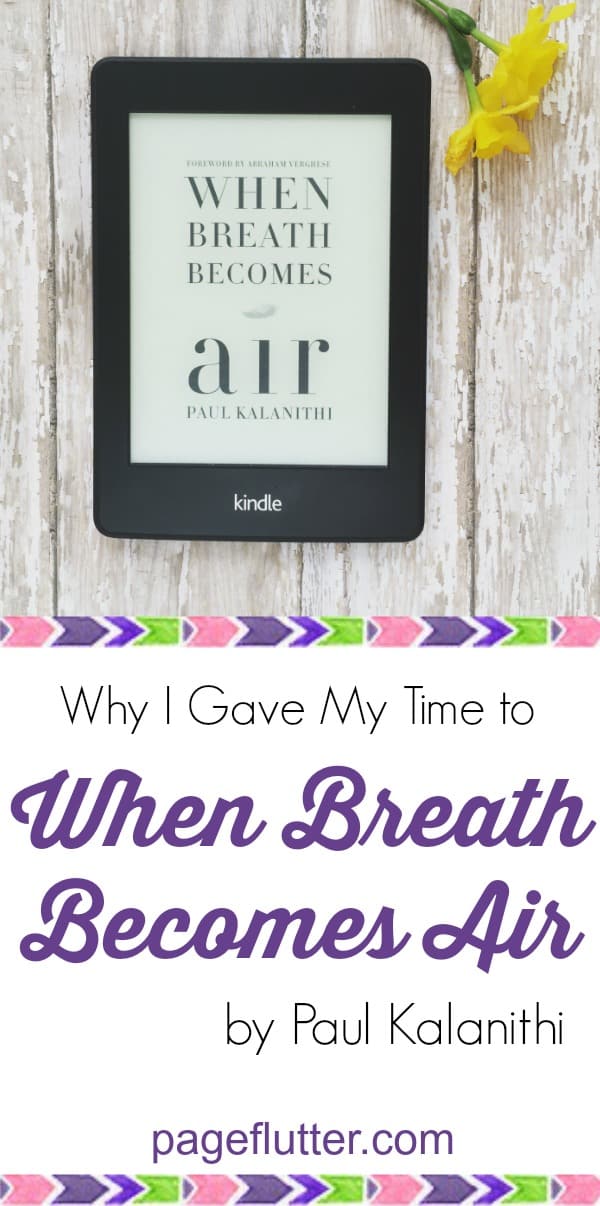I recently read “When Breath Becomes Air”, and I just had to share it with you.
|Why I Gave My Time to When Breath Becomes Air|
“I finished the book,” I texted my friend, Brooke. “If I go missing, you should tell the detectives to check under the mountain of tissues in my living room.”
I originally picked up When Breath Becomes Air because Brooke wanted to read it together, and if I’m being honest, I wasn’t sure it was going to be my kind of book.
Memoirs, in general, are not my bag. I do appreciate their artistry. By nature, they mine everyday experiences for hidden truths. They’re stories by and about real people, bringing unthinkable experiences close enough to touch, to walk in someone else’s shoes. But when it’s time to kick back with some leisure reading, I’m a fiction gal.
So, imagine my surprise when I not only enjoyed this memoir, but became invested in it. I found myself copying long quotes from the book into my bullet journal, either for the emotional impact or pure beauty of his writing. I must have highlighted dozens of words for my writing lists. In fact, I procrastinated this review for fear I wouldn’t do the book justice. It’s a must-read for disciples of mindfulness, the scientifically curious, or anyone who wonders, “What’s the point of it all?”
Written by neurosurgeon and literary student Dr. Paul Kalanithi, When Breath Becomes Air is a stunning account of his journey to understand life and death. He gracefully parallels metaphysical questions with science, and faces his life-altering (and ultimately life-ending) cancer diagnosis with rare candor. You’ll have to forgive my references to him in the present tense, but on the pages of this book, he remains very much alive.
Having earned his master’s from Stanford in English, as well as being a neurosurgeon, Kalanithi is well-poised to explore the inner-workings of the mind and the physical limitations of the brain. He notes that despite the sweeping effects the cancer had on his life, from a mortality standpoint, nothing had changed.
The fact of death is unsettling. Yet there is no other way to live.”
—When Breath Becomes Air, page 132.
Now, having said all that, this is just the sort of morbid excerpt that two months ago would have sent me running for the hills! So, let me explain why this book is so different…
It’s not depressing. Yes, there is sadness inherent to any story involving loss, but Kalanithi’s focus remains on life and how we extract meaning from whatever time we have.
In the epilogue, Kalanithi’s wife tells us:
Paul’s decision not to avert his eyes from death epitomizes a fortitude we don’t celebrate enough in our death avoidance culture…Writing this book was a chance for this courageous seer to be a sayer, to teach us to face death with integrity.”
–When Breath Becomes Air, page 216.
When Breath Becomes Air is a candid look at terminal diagnoses, spirituality, and a life as beautiful as it is fleeting. Kalanithi’s unique perspective on time made me reexamine my own notions that a long life is one well-lived. Whether I have days, years, or decades remaining on my clock, I would consider the time I gave to this book well-lived.
Over to you! What nonfiction books have you read that changed your perspective?
Brainstorm with me!
Subscribe to my newsletter for Page Flutter updates, posts, and announcements,
and FREE access to resources in the Vault!
Don’t worry, I only deliver the good stuff. No spam.
Facebook // Twitter// Instagram // Pinterest










